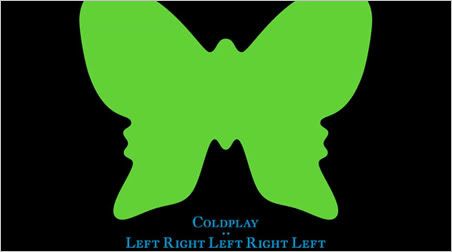
“Clocks”
from the album Left Right Left Right Left
2009
When most of the world first met Chris Martin, he was a sad dude wandering around a beach in his windbreaker and singing about everything being yellow. If Coldplay started out as one of many earnest post-Britpop bands in the late 1990s, they’ve beaten the odds to become one of the biggest bands in the world, the kind whose album releases become events and whose impact reaches beyond the confines of a genre, country, or audience. Coldplay are, in short, the kind of band that can give away a live album gratis. Left Right Left Right Left is free to anyone with a ticket at their live shows and anyone with an internet connection at their web site. While I’m sure there’s a suit somewhere tearing his hair out over this, it’s not quite as ballsy as Prince giving away free copies of Musicology or bundling Planet Earth with the London Daily Mail. On the other hand, you might want to listen to LRLRL more than once.
Seriously, they could be selling this shit. After all, Live 2003 got a full release complete with a DVD, and it doesn’t even approach the confidence and dynamics of LRLRL, which showcases a band much more comfortable and commanding on stage. All the big moments they’ve tried to create in the studio finally come alive on these tracks: those tectonic shifts that push opener “Glass of Water”; the mechanistic jam of “Clocks,“ especially when Guy Berryman re-creates the vocal melody on bass against Martin’s cascades of piano notes; the communal grandiosity of “Viva la Vida”. Despite a fairly conservative tracklist, LRLRL sounds like the band finally coming into its own, presenting as a live act rather than a studio band.
Much of the credit goes to the audience — those thousands of fans singing devotedly along with Martin and exploding during the big moments. Maybe that’s why LRLRL is a giveaway: The crowd may be legally obligated to co-billing, especially that woman singing herself hoarse for a few notes on “The Hardest Part / Postcards from Far Away.” Here’s a quick before-and-after demonstration: The opening lyrics to “42” are some of his worst, and Martin alone can’t save them. But hearing him sing those same inane lyrics with a couple thousand people backing him up make that mood-setting melody sound pretty good actually. LRLRL owes its life to the audience, whose handclaps give “Viva la Vida” the sense of heraldry missing from the album version and whose insistent singing on “Fix You” defuses the song’s Messianic rumblings.
Of course, the crowd can’t rehab all of Coldplay’s material. “The Hardest Part/Postcards from Far Away” is a middling piano ballad that feints toward “Sorry Seems to Be the Hardest Word” territory but runs straight for Billy Joel. And ending with “Death and All His Friends,” especially after “Fix You,” seems particularly anticlimactic. Martin no longer has to cajole the crowd into participating, as he did on Live 2003; instead, the band seems utterly confident the audience will hang on every word and note. Even so, he does deliver some overeager stage banter. “This is the moment in the concert when we show you how good our band really could have been,” he says by way of introducing drummer Will Champion, who sings the short, strummy “Death Will Never Conquer”. Champion does a fine job, sounding late-Poguish and completely at ease, but Martin’s comment seems little more than hollow self-deprecation, only pointing to his reputation as the band’s handsome, actress-bagging, Jeff Buckley-copping frontman. And just try not to wince when he alters the lyrics to “Fix You” and renders the song self-referential: “five hundred meters from the band at the Coldplay show.” You can’t touch the hem of his garment from that distance, but those are still pretty good seats.
Coldplay are the biggest band in the world because they believe themselves to be, which is the kind of titanic self-actualization typically associated with salesmen and self-help books. But they are humble in their hubris: Not only do they provide a service — essentially giving listeners what they want — but in this case, they’re doing it without charge. Ironically, those contradictory qualities mean the band may be wasted in a studio, Eno notwithstanding. LRLRL suggests that Coldplay songs truly live only in vast concert halls and smallish arenas, where they are performed for, and arguably by, a captivated audience.


